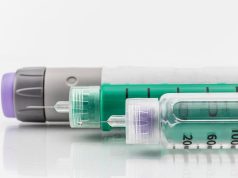Phase 1 study shows safe, efficient depletion of deposits in liver, kidney in systemic amyloidosis
THURSDAY, July 16, 2015 (HealthDay News) — For patients with systemic amyloidosis, treatment with (R)-1-[6-[(R)-2-carboxy-pyrrolidin-1-yl]-6-oxo-hexanoyl]pyrrolidine-2-carboxylic acid (CPHPC) followed by an anti-serum amyloid P component (SAP) efficiently depletes amyloid load in the liver and kidney, according to a study published online July 15 in the New England Journal of Medicine.
Duncan B. Richards, D.M., from GlaxoSmithKline Research and Development in Stevenage, U.K., and colleagues conducted an open-label, single-dose escalation, phase 1 trial involving 15 patients with systemic amyloidosis. CPHPC was used to deplete circulating SAP, following which, a fully humanized monoclonal immunoglobulin-G1 anti-SAP antibody was infused.
The researchers observed no serious adverse events. In some of the initial recipients of larger doses of antibody, infusion reactions occurred; for later patients, slowing the infusion rate reduced reactions. Patients who had received a sufficient dose of antibody in relation to their amyloid load had reduced liver stiffness at six weeks, based on measurement with use of transient elastography. As shown by means of SAP scintigraphy and measurement of extracellular volume by magnetic resonance imaging, these patients also had improvements in liver function in association with a considerable reduction in hepatic amyloid load. There was also a decrease in kidney amyloid load and shrinkage of an amyloid-laden lymph node.
“Treatment with CPHPC followed by an anti-SAP antibody safely triggered clearance of amyloid deposits from the liver and some other tissues,” the authors write.
The study was funded by GlaxoSmithKline.
Copyright © 2015 HealthDay. All rights reserved.








